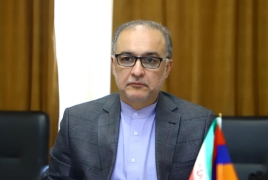
Iran’s ambassador to Armenia, Mehdi Sobhanī, addressing the Iran‑Israel conflict, stated that “the zionist regime’s aggression against Iran is a continuation of eight decades of violations of law by that regime.” He emphasized that the UN security council must intervene to stop this aggression.
He asserted that the regime is “the greatest violator of international law and norms, including the UN charter, humanitarian law, and human rights,” according to 1lurer.am .
He called the “illegal armed assault by the zionist regime on Iran” not just an attack on one nation, but “an attack on the entire UN system and a serious threat to international peace and security,” adding that the Security Council is obligated to act to end the aggression.
He criticized the justification of the regime’s military aggression as preventing an inevitable threat from Iran under the pretext of preemptive defense, stating that such a rationale is “in no way accepted in international law or the UN charter,” constituting “an obvious breach of Article2(4)’s prohibition on use of force.” He recalled that under Article51, “Islamic Republic of Iran has the inherent right to self‑defense, and this right is inalienable.”
The ambassador also reported that no casualties or injuries have been recorded among the Armenian community in Iran, as announced by Sputnik Armenia.
Regarding whether citizens had left Iran and relocated to Armenia due to the military situation, he clarified that the situation within Iran “remains as normal as possible, and no mass departures have been recorded.” On the contrary, Iranian authorities are working to enable their citizens abroad to return home, despite flight cancellations hindering their return.
“They don’t have figures on how many Iranians have moved to Armenia due to military actions. However, a large number of citizens who had traveled to Russia and Turkey have been able to return via the land border with Armenia,” the diplomat stated.
Addressing reports of increased activity at the Iran‑Armenia land border, he noted that before the escalation, about 20 flights per week operated between Armenia and Iran. Now, due to flight suspensions, citizens are forced to use land routes to reach Armenia.
On June13, Israel launched large‑scale military operations against Iran, accusing it of secretly implementing a nuclear weapons program that has reached an irreversible phase. Israeli air strikes and covert operations targeted Iran’s nuclear infrastructure, military command, scientists, air bases, air defense systems, and surface‑to‑surface missiles.
Iran, which denies any military dimension to its nuclear program, responded with large‑scale missile and drone strikes targeting israeli military and defense industry infrastructure. Strikes from both sides have struck civilian areas, resulting in casualties among the civilian population.

